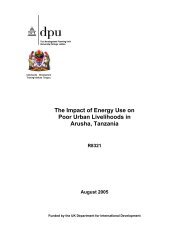EPA Review Annex Documents - DFID
EPA Review Annex Documents - DFID
EPA Review Annex Documents - DFID
You also want an ePaper? Increase the reach of your titles
YUMPU automatically turns print PDFs into web optimized ePapers that Google loves.
area of regional integration (although interestingly with no explicit reference to the<br />
harmonisation of SPS measures).<br />
Equivalence<br />
From the outset, the ACP states evidently saw the <strong>EPA</strong> negotiations as a way in which to<br />
achieve specific agreements on equivalency of SPS measures, broadly along the lines of<br />
those in the EU-Chile Association Agreement (see above). The capacity-building needs of<br />
many of these states, however, rendered talks of such agreements superfluous in the short<br />
and medium terms. In some cases, however, the notion of equivalency remained a longterm<br />
aspiration. Thus, the final agreement between the EC and CARIFORUM and the<br />
interim agreement between the EC and the Pacific states make reference to the equivalence<br />
of SPS measures, whether between the ACP signatories or between the ACP signatories<br />
and the EU. In the case of the CARIFORUM agreement, the language is rather weak (see<br />
Article 56 Part 2 above). Indeed, the agreement does not appear to add anything<br />
appreciable to existing obligations under Article 4.2 of the SPS Agreement; for WTO<br />
members to, upon request, enter into consultations with the aim of achieving bilateral and/or<br />
multilateral agreements on the recognition of the equivalence of particular SPS measures.<br />
The interim agreement between the EC and the Pacific states, in contrast, makes a more<br />
explicit commitment to consider the equivalence of SPS measures, notably between the<br />
Pacific states and the EU. Thus, Article 37 states:<br />
1. ‘The Parties recognise the importance of making operational the<br />
provisions of Article 4 of the SPS Agreement and to enable the Pacific<br />
Parties to have the equivalence of their SPS measures recognised by<br />
developed importing countries.<br />
2. The Parties reaffirm the Decision on the implementation of Article 4 of<br />
the Agreement on the Application of Sanitary and Phytosanitary<br />
Measures of 23 July 2004 of the WTO Committee on Sanitary and<br />
Phytosanitary Measures. The EC Party agrees to give due<br />
consideration to reasonable requests from one or more of the Pacific<br />
States to examine the equivalence of their SPS measures in areas of<br />
particular export interest to the Pacific States.’<br />
It is easy to make too much of this Article. On the one hand, it could be seen as simply<br />
restating existing obligations under the SPS Agreement (see above). On the other, it is<br />
difficult to envisage widespread equivalence being established in view of the capacity<br />
constraints faced by the Pacific states. Such an explicit reference to the scope for<br />
equivalence between ACP states and the EU, even simply as an aspiration, however, is<br />
glaring in its absence from the other <strong>EPA</strong>s.<br />
Regional integration<br />
All of the final and draft agreements involving multiple countries put considerable emphasis<br />
on regional integration, notably through harmonisation and/or mutual recognition. However,<br />
there are appreciable differences in language across the agreements with respect to<br />
whether this is seen as an aspiration versus a firm commitment (see harmonisation section<br />
above). Predominantly, the focus of these provisions is on increasing regional trade<br />
between ACP countries. The interim agreement between the EC and Central Africa is a<br />
notable exception is committing the parties to mutual recognition in the case of EU imports to<br />
the region. Thus, Article 46 Point 2 states:<br />
‘With a view to facilitating trade between the Parties and in conformity with<br />
Article 40, the signatory Central African States agree on the need to<br />
harmonise import conditions applicable to products originating in the territory<br />
243
















